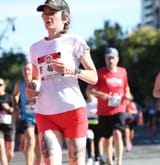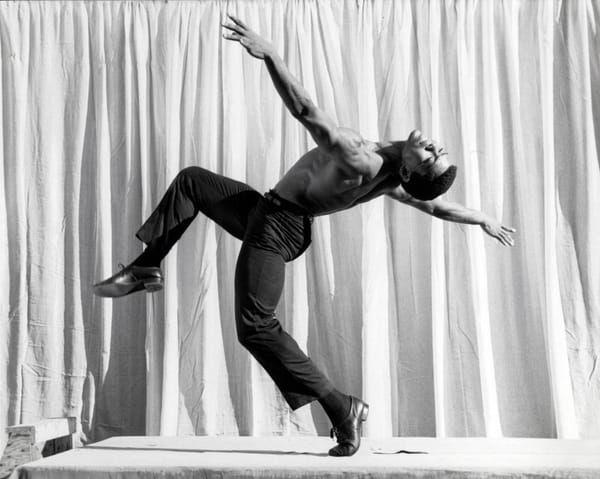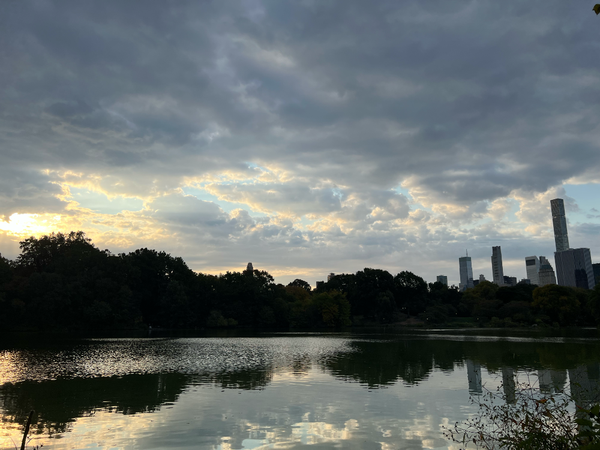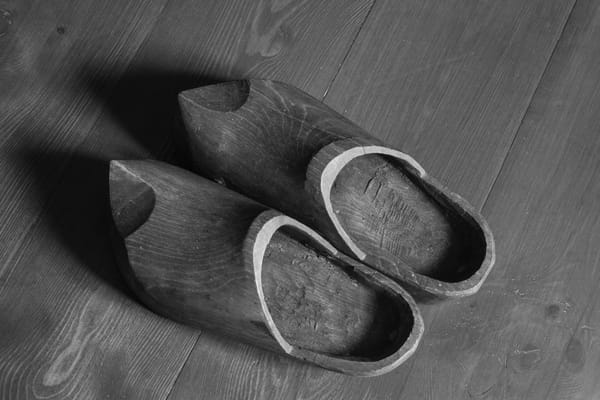Climbing Over the Wall: A Conversation with Jazzercise Instructor Amy Collier
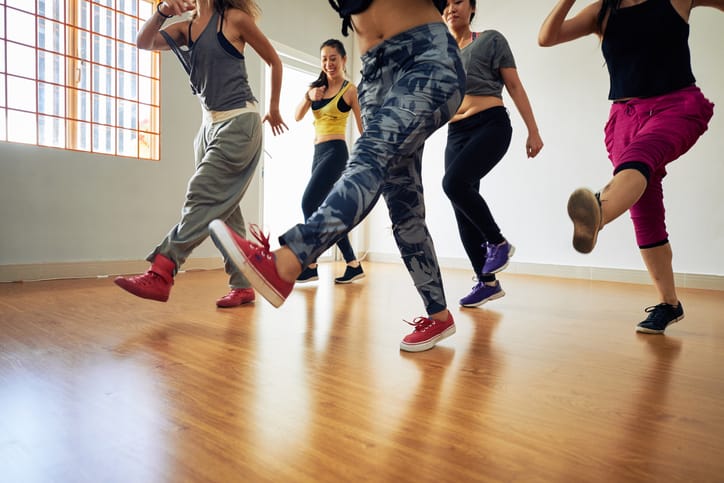
Welcome to Episode 5 — I think it's 5 — of the Second Breakfast podcast. I have to say, I am not very good at this whole podcasting thing. I should apologize in advance for the quality of the sound in this one. And today's guest — Amy Collier — and I recorded this way back in February. It's still a fabulous discussion — no surprise since Amy is one of the most wonderful people I know. She's the Associate Provost for Digital Learning at Middlebury College. She's also a hockey player. She's a Jazzercise instructor. And I believe, since it's been so long since we sat down together, she's a Spartan. That is to say, when we recorded this, she was training for her first Spartan race. I was in the early stages of training for my half marathon — indeed, I'd just had my "accident" (or rather, I was just knocked to the ground by some random on the street). When this podcast airs, I'll have my finisher medal in hand (I hope).
But first things first… a terrific discussion with Amy about mental and physical health, welcoming all bodies and all ages into exercise and movement, facing our fears, and so much more.
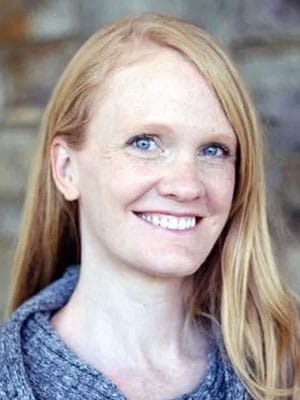
Audrey: Thank you for agreeing to be on the podcast. And I am so stoked to get to talk to talk with you about jazzercise. Oh my gosh.
Amy: I'm so excited to be here and to talk about Jazzercise. I love talking about it.
Audrey: I recognize that it's like a huge part of your life, of your identity, I guess I'd say.
Amy: It is, and it wasn't always that way for me, but I had an opportunity to kind of invest in it, to really kind of bring it into my life in a meaningful way, not because I necessarily thought of it, just because there was a moment in my life where I needed to make a decision about what I was going to do.
I think for me it filled a void around teaching because I, I used to teach, right? In some of the educational institutions where I've worked, I’ve found it so soul sucking sometimes to teach. And so once I found that I could teach jazzercise and really actually love that teaching experience, I was like, Oh. This is what I'm gonna do. This is so important to me.
Audrey: I’m really interested in the language we use to talk about this – teaching, coaching, mentoring – and then the set of practices around these. And then the way in which we see people in those positions, you know, the way we feel about the person who teaches jazzercise might be very different than the relationship we have with someone who's a college professor, even though they're one of the same people. So what's different?
Amy: I think what was challenging for me was the role I had to play in assessing students.
And this winter term class I just taught, we did ungrading as a model, as a way to assess our students. And I was really grateful for that as a framework for not grading my students. We still have to turn in a grade at the end of the semester, right? And to me, what I love about teaching Jazzercise, my role there is entirely to help the people who are participating in my class get where they want to go, to feel a little bit better. It's not about some arbitrary standard or metric that people have to live up to. It really is, can I have you for one hour and can I help you feel just a little bit better today? Can I make your day a little bit better? Can you walk away with a smile? Is the stress melted away? Those are the metrics of a Jazzercise class. And that's way more fun than some of the other metrics we have to hold on to for educational purposes.
Audrey: Totally, totally. to be able to meet people where they are and help them figure out what their goals are is just a very different practice than, like, I've decided what your goals should be. Your goals at the end of the day are to pass this class and here's the set of things that I've decided you need to know.
Amy: It is a really different relationship with expertise, right? Because I am, in Jazzercise, somebody who has worked hard to develop expertise in teaching and safe, effective practices around weights and stretching and all that stuff. So it's not like I'm not an expert, but my role in that environment is to support you in whatever you're trying to accomplish and feel stronger, do it in a safe way, have fun doing it, versus I think a lot of times at higher education institutions we are kind of expected, especially for those of us who are in staff roles, which I am, right? And I don't get to teach very often because I'm a staff member. Expertise is something you really have to earn and showcase and, like, it's part of the identity of an instructor at a higher education institution and that relationship with expertise in a fitness class is different.
The relationship with expertise in one's own body is very different too [in the university classroom versus at the gym] . You can be a doctoral student in a field and there's still an idea that like you have zero expertise, zero power. Whereas in a good fitness class, there is a certain trust that you are. at the end of the day, the person who can say, this is too hard. This is not hard enough.
Audrey: And I think the relationship with expertise in one's own body is very different too. You can be a doctoral student in a field and there's still an idea that like you have zero expertise, zero power. Whereas in a good fitness class, there is a certain trust that you, that you are at the end of the day, the person who can say, this is too hard. This is not hard enough. Um, this, it hurts when I do this. It feels great when I do that.
Amy: Yes. And a good fitness class is really going to encourage you to listen to that, right? And I won't say every fitness class is like that. There are certainly fitness classes I've attended where you don't feel like that expertise in your own body is validated. And it's even considered weakness to listen to it.
But not in my class, and certainly not in Jazzercise as a program. We really do want people to listen to their bodies, to do what is going to work for them, that's going to feel good. So we show low impact options anytime we hop or jump or do something that gets our feet off the floor. We show low impact options to say, you know what? If that's where you need to be, that is great.
Audrey: Yeah. Yeah, there can be so many barriers to entry around these things. When we moved to New York and I was shopping for a gym there were a lot of places where it hadn’t occurred to them that someone might not be able to move a 45 pound barbell. It was not even on the radar that different bodies might have different expectations and that's so frustrating. It's so frustrating.
Amy: Yeah, and until the 60s, late 60s, early 70s, women were not considered part of the fitness industry at all. It was considered un-feminine to sweat. It was considered not feminine to participate in any kind of investment in your body. And you know, jazzercise was a key part of changing that. And I'm really proud of that history, right? It started, it was started in 1969, so it's 55 years this year, 55 years.
Audrey: So it definitely predates aerobics... or what I think of as aerobics?
Amy: It actually coincides exactly with aerobics. So the year that aerobics became a thing, which hilariously, given our conversations around educational technology and the relationship to the military, the idea of aerobics actually came out of the military.
The fitness industry for women has made enormous strides, but there is still a lack of inclusivity, especially in the gym culture, right? There are lots of exercise cultures that are just not inclusive of women or other gender identities.
Audrey: Nike, for example, like they missed it. They were so busy, in the early seventies when Nike was started, they were so busy putting shoes on white guys, putting running shoes on white guys, that they didn't even recognize that there was this whole other market, not just like running shoes for women, obviously, cause that was, you know, your uterus might fall out if you run, but they missed the whole aerobics thing. I guess, I think that was where, would it have been Reebok maybe, or one of the other shoe brands was like, oh yeah.
Audrey: So how did you get started?
Amy: Oh boy, I had never really had much of experience with any kind of group fitness at all. I grew up in another country. And it just kind of wasn't a part of my life. And I came back to the States in my teenage years. I got diagnosed with a chronic autoimmune issue and had just years of a lot of unwellness. I was unwell, I went through a ton of things, you know, ends of relationships and having a child and all that kind of stuff. And I got to the point after having my kid where I was in a really dark place, really dark place. I had postpartum depression. I was, when you're in that space of depression, it's hard to even see what, I don't know, it's hard to describe it. Like, you don't see, the ceiling is so low.
Everything around you is so close and nothing feels right. It's hard to kind of look up and look at the world and say, oh, OK, you know, I could do this or I could do that. And I was so lucky during that pretty dark time to have people around me who were supporting me. And one of those people was my best friend, Jess. And she had started jazzercise. She started doing jazzercise. I think after she had her baby a few years before, she had started doing jazzercise. And I don't know why, but it was like almost the only thing that still connected us because I was so in a dark place. I wasn't really connecting with people very much. And she just kind of kept finding me and saying, you know what, let's go to Jazzercise. Come to Jazzercise with me. Let's come to Jazzercise. And at first I really disliked it because I felt terrible. I just, nothing about me felt right. And it wasn't that the program was bad or anything like that. I just, I was in the wrong headspace. But Jess just kept kind of caring for me in a way that I will never forget. And over time I started to just find a little bit more of me in it and I started to really understand that this program could be a helpful part of my life. And at the same time, I was starting to get help, seeing a counselor, getting on some medication, right? So all those things kind of came together and it just really started to click for me that this was something I could love, that I could care about myself again through Jazzercise, that I could connect with people again through Jazzercise, again, things that I was really struggling with when going through the depression.
And so for me it really became a space of remembering who I was and remembering that I could love something and love feelings, feelings even. And so that's just that's how I got into it. And I'm always super grateful to Jess for helping me through that. That was tough.
Audrey: Yeah, that really resonates with me too. I mean, there's just that feeling, you know, I think that for me it was also illness, feeling, just feeling so weak. And I was, I was literally so weak and realizing that I had to, I had to change something and just having, and that weird process of becoming strong physically, just how much that contributes to being able to make a change in how you feel mentally and vice versa as well. But then also just like that weird part of like being in your body, I think culturally, technologically, there are a lot of things that encourage us to not pay attention to our bodies, to not feel.
And this process of discovery and becoming that I think is really, really powerful. Yeah. And definitely feel that same like, Oh my God, it saved my life. Yeah.
Amy: I agree.
And I feel horrible sometimes saying that because I don't subscribe to the idea that physical fitness can solve grief or depression, right? Which you get that message a lot, right? Oh, it'll solve everything. I don't believe it can, but what I do believe it can do is help you find some of what depression and grief take away from you and help you find a different path. Like I don't feel like I'm ever going to be past depression. Like that's always going to be part of my life. But with this path that includes Jazzercise and supportive people around me, friends and investment in myself, I feel like it's just that journey now has all these different pieces to it. And it's both richer and more challenging for that reason.
I don't subscribe to the idea that physical fitness can solve grief or depression, right? Which you get that message a lot, right? Oh, it'll solve everything. I don't believe it can, but what I do believe it can do is help you find some of what depression and grief take away from you and help you find a different path. Like I don't feel like I'm ever going to be past depression. Like that's always going to be part of my life. But with this path that includes Jazzercise and supportive people around me, friends and investment in myself, I feel like that journey has all these different pieces to it – and it's both richer and more challenging for that reason.
Audrey: So how often do you teach?
Amy: I've been teaching for 12 years now. So it's been a long time. I actually started in California when I was at Stanford. I had moved out to California at Stanford without my family, my husband and son had stayed back in Texas to sell the house. And I was like, well, this sucks. So I might as well do something awesome. And I got certified to become an instructor during that time, which again, probably helped me get through that time that was really challenging. And I've taught at different places in California. And then when I came out here, I started my own center. So I run my own center and then we have eight classes a week. I teach five of those. So yeah.
Audrey: Wow. Damn, Amy, that's awesome!
Amy: Yeah, it's, you know, it's like I said, teaching and being part of Jazzercise has been just such a transformational piece in my life, but being able to own this program and have clients who I know so much of their stories. I know so much of what their hard times and their good times look like. And to be part of that is like such a gift. I will never take that for granted.
Audrey: So, who does jazzercise these days?
Amy: We have a really wide range of people. Because it's been around for so long, there are lots of people who have just have a long history with it. And so we do have, I think the oldest member I've ever had, and I, this was out in California, I had a fellow who was in one of my classes out there who was in his 80s and he was dynamite. Oh man, I love that man so much.
We have a wide range. I mean, the music that we use is popular music. And so that is appealing to a wide range of people, people who know that music and that's their music, right, younger people, but also people who come to Jazzercise and say, this is where I get my pop culture understanding because like I don't listen to this music any other time but at Jazzercise.
Audrey: I gotta say that was how I felt at Core Power Yoga was like, or not Core Power Yoga, at Orange Theory, I was like, huh, I have no idea who this is. I'm that person now.
Amy: I know way more about pop culture than I ever have in my life and that's because of jazzercise and that's kind of fun, you know.
Audrey: And you also play hockey. I'm guessing that was not something you did in Brazil.
Amy: No, it was not. It was not for sure. And hockey is actually something, again, I came to later in my life. It preceded jazzercise. I actually met my friend Jess through hockey first. So that's how she came into my life. So yeah, I was in grad school in Texas and there was an inline hockey rink just down the road. So rollerblades. I had never strapped on a pair of inline skates in my life, but somehow ended up at this place and joined an instructional league, which is a league that, you know, where they teach you how to play hockey. And in that instructional league, the guy who was running it, was like, okay, I'm gonna teach you all how to play hockey. You're gonna come once a week for a few months, and then you're gonna become a team, and then you'll play for the leagues here. I was like, well, first of all, that guy's super cute. And second of all, okay, that sounds fun. Let's try that, right? And as we got towards that time where we were becoming a team, he said, okay, now we need to find somebody in this group who's gonna be the goalie. And he's like, it's hard and it's different and it's not for everybody. And I was like, that sounds like me. I think I'll do that. So I signed up for the hardest position on the court and loved it. So I played in line for a few years, started dating that guy who was our instructional coordinator and he ended up being my husband.
It turned out well.
I played for a few years and then I got pregnant and had to stop for a bit and didn't play again until we moved to Vermont and started playing ice hockey here, which was totally new because I had not done much ice skating either. And so I've been playing since we moved here, which was about nine years ago. So I still play, it's super fun. My hips don't love it, as a goalie, as an older lady goalie. My hips kind of yell at me sometimes, but I just, I don't know, there's something about it that's so recharging. It's just kind of, I don't know. Having puck shot at your body raises that adrenaline in a way that I find super fun.
Audrey: I think a lot about this with myself — I never had the confidence to try physical activities. I mean, partly I have like just terrible eyesight, and I just never saw myself as being athletic. So how do you have the confidence to try something like hockey? But then how do you help cultivate that in students who might not see themselves as being somebody who's athletic or capable… how do you sort of help people get there?
Amy: It's a great question because I've always thought of myself as somebody who is athletic but never been around sports. I never played sports growing up. And so I didn't have the confidence that one needs to kind of walk into a rink and be like, yeah, this is my thing. I think you're right that what matters here is who's leading you through that, who's helping you and supporting you and building that confidence. And, you know, for hockey it was the guy who ended up being my husband. For jazzercise, you know, first it was Jess and then, you know, the instructors. And I love playing that role for people. And what I think, you know, sometimes folks come to my program and they feel awkward in the way that I felt awkward when I first started. I'm not a dancer. I don't have a background in dance. And I try to be for them what I needed to get through that, which was, look, if you can't do a move, just march, right? Do whatever feels good for you. Laugh at yourself. Have a good time, right? Give less space to those feelings of inadequacy and try to create more space for support and fun. I think that really helps, and the confidence comes over time.
If people will stick with it and they'll, you know, trust me, I think they find that too in my program.
Audrey: Yes, it does take practice. I mean, we call these things "practices" because, you know, even like like Tom Brady didn't wake up or wasn't born as, you know, a star quarterback. In fact, I think like the classic story is his like draft report was like, thumbs down, this dude has a terrible arm; he's not going anywhere, right? So it takes practice.
But you have to let go of judgment and that's some of what you were saying about the difference between a classroom and the studio. You're not being judged.
I've been lifting weights for a while now and I've got like my personal fitness trainer certification. And often, when I look around the gym at the dudes, they truly have no idea what they're doing. They're just like walking up, putting some weights on the barbell, doing like four squats and then walking off. They have no system or method. They don't know how deep they need to go or where their knees need to be. They do have bravado. They do have confidence though.
Amy: I remember, after I was diagnosed with a chronic illness, when I started to realize that I needed to pay more attention to my health. I remember thinking like, I don't know what to do. I don't know what this looks like. Nobody was telling me, you know, you need to make sure you're lifting weights. You need to get some cardio and the cardio should do this and this and this. You need to make sure you're stretching. None of that stuff was apparent. I was lucky to find a program that had all that stuff in it and jazzercise. But I do think, you know, if I can help play the role of building people's confidence and help them understand what it looks like to really effectively work with your body and do it safely and do it in a way that helps you feel lifted and edified by it. I really treasure that role because I think you're right, there are too many people who either don't get that and shy away from it or don't get that and assume a space of false bravado that ends up making them look dumb and get hurt, right?
Audrey: Yup, they get hurt. I do have this like weird new confidence now and I'm always thinking like, oh, what's the new thing I can try? So on Christmas day, we went ice skating at Rockefeller Center. And like, I had not been on ice skates, oooooo, in like 35 years. That was an adventure. We did it.
And now we live around the corner from the Alvin Ailey dance studio, and I see they offer "absolute beginner" ballet classes. And I'm like, why not? It's like, what's gonna happen? The same thing that happened when I was six, and then they were, like, oh yeah, please don't come back. No, that's not gonna happen. Just give it a whirl.
Amy: Yeah, I am so in that same boat too. And first of all, you know, it is not trivial to strap on death blades to your feet. Right? So like, good on you for doing that. And falling on ice is hard, it hurts.
Audrey: I thought it would be fun. Kin and his daughter and I went, and as we were stepping out on the ice, Kin said never been ice skating before. And I was like, oh, oops. Merry Christmas.
Amy: I've had such an interesting journey with that lately too. I, one of my jazz exercisers, who's also a dear friend, Heather, came to me and asked, why don't we train for Spartan race?
Sounds like fun! But what was fascinating, what's been really fascinating about it to me is that I've had to accept the fact, because you know, because I have developed such confidence in my strength and in my body awareness and in my cardiovascular fitness, because of jazz or size and hockey, I kind of went into it like, yeah, no problem. This will be no big deal. And boy was I really mistaken about that.
I got there and it's an obstacle course. We go to a trainer who helps us with obstacle course race items, right? So she's got like monkey bars and rope traverse and rings that you swing from and all this kind of stuff like walls you have to climb over. And I thought, I'm strong I can probably do like half of these.
I did a zero of them — exactly zero of them and had to really come back to like beginner's mindset. So one week, I could do zero things, the next week I can do half of one thing… progress and you know I've been doing that about ten times. And I've got a couple of wonderful girlfriends who go with me and we support each other. And like, you know, at the smallest little victory, we're like, yeah, big celebration, lots of bruises, lots of little mini injuries, but we are just are chipping away just a little bit at it, right? I can now do the rope traverse from start to finish, which is, you know, like a huge thing for me. So, you know, it's been really interesting to come back to that after so long of kind of being at the top of my game in terms of the things that I've been doing.
Audrey: That's awesome.
I think about that willingness to try, to try new things and to try new things physically. I think it's hard at any age, but I think particularly as we age, there's so many narratives, I think, wrapped up in like the fragility of women aging. I hear it all the time — don't break a hip. You know, knock wood, that's not gonna happen. But like, I don't know.
Amy: Well, it almost feels more likely to happen if I'm not doing things that are physical, right?
This obstacle race training has been pushing my fear buttons way more than anything I've ever done before. And there are times where I have to, there are times where I just say, no, I can't do this. I don't feel safe.
Audrey: Like the rope climb stuff, totally.
Amy: Yeah, like, you know, there's a wall that's kind of tilted back towards you at like a, what is that, 45? And, you know, you're climbing it with using like little tiny grips, little tiny footholds, footholds. And, you know, and then you're up, you know, 15 feet off the ground, and you're having to cross over this wall thing. And, you know, like, it just, it hits my fear button a lot. And...
Audrey: I went rock climbing with my nephew and I wasn't that far off the ground to be frank. But he was like, just jump down. Jump down?! Oh. Yeah. OK. But still. It is really scary.
Amy: It is. And there is injury potential always with this stuff. Yeah, and then lots of bruises. I get lots of bruises. But, you know, I guess what I love about it is, I just feel like, again, like, these tiny little victories just mean a lot because they're so hard earned. And I think at this stage in my career and at this stage in what I do with Jazzercise and hockey, like having to work that hard for something just feels really rewarding sometimes when you make that little ounce of progress.
Audrey: That's so true. It's so true. I mean, I think it's like there's something about seeing, you know, seeing improvement. Like it's really corny. And it's like, I'm still trying to figure out what I think about, I mean, obviously about like fitness technologies and tracking stuff. I'm like not super into it. But then I love that idea of like, of getting better. And I mean, one way you tell us through numbers, right? Like last week, there was this much weight on the bar. Now this week, there's more.
Amy: I think one of the things that's super challenging about working in this space of fitness and the fitness industry is that the things that we've been told are metrics for success are often not, right? They've been claimed by certain people with certain agendas, certain corporations with certain agendas to give us something to work towards to buy more products and that kind of thing. So it's really hard to know what it actually means to feel progress in this space, except for how you feel, which matters. And so that can be really challenging because I think you're right, part of what makes this a rewarding experience to invest in one's fitness is to feel like you're making progress. And if you don't know what that looks like, it can just be really demoralizing.
Audrey: Something like jazzercise — it's not a numbers game the way running or weightlifting or even hockey is, right? So what does progress look like then in jazzercise?
Amy: A lot of folks do wear tracking devices that help them put together some ideas around that, right? I do too. I have one. But I think for me, at the end of the cardio section, you know, do you feel less fatigued? Like, do you still have something in the tank? That's progress, right? And when we work with weights, the question might be, were you able to use one level up in terms of pounds for your weights? Did you go from a seven pound weight to an eight pound weight? Great, that's progress. And then we do stretching in all of our classes as well, so are you able to stretch a little bit deeper and help prevent some injuries in the future? Although that's impossible to quantify, but those kinds of metrics could be what people will have. And then also like, did you just have a great time? Do you feel better? Do you not wanna murder people? Like those are all metrics for me.
Audrey: Yeah, yeah, totally. I think about what makes a great workout, because it can be the numbers went up, right? But like, that's often not the thing. That's not the place where I often think what makes a good workout. So like yesterday, I had like,
So yesterday I went for a run. It was a beautiful day. Went for a run. I was a block away from home running back and some guy stepped out in front of me and on purpose shoulder checked me hard. And I went flying. And of course got road rash on the palms of my hands. Cause men are like that. Men, yeah, anyway. And so today I had to like do a different workout. I couldn't do the barbell. I can't do anything with my hands today. But yeah, so it was like, I had a good workout though today, it wasn't the workout I had planned obviously, but I still did something. It's not as quantifiable, it's not as measurable, I think, as the tech industry, the fitness industry wants us to think. t's much mushier.
Amy: When I think about the classes that I teach where people come up after, you know, my jazzercisers come up afterwards and say, God, that was a great class, it's because there was great music or we laughed a lot. And yes, they probably felt like it was a good workout in terms of like their muscles are fatigued and their heart rate got up and all that good stuff. But really, did we laugh? Did we have a good time? What was the vibe in the room good? Those are things that I think people end up really caring about.
Audrey: It's this other liminal space that you get to be in, which is one of the things I think is so precious about fitness that I don't want to be colonized, if you will, by the numbers-folks. It's this other space where you don't have to think the normal thoughts; I mean, you can think your normal, regular thoughts, but you are able to sort of physically be and do a different thing than your normal "productive" work that we expect. And your brain is able to sort of have a break or work on different kinds of mental tasks than normal, whether that's music or whatever you do when you're you know working out.
It's this other liminal space that you get to be in, which is one of the things I think is so precious about fitness that I don't want to be colonized, if you will, by the numbers-folks. It's this other space where you don't have to think the normal thoughts; I mean, you can think your normal, regular thoughts, but you are able to sort of physically be and do a different thing than your normal "productive" work that we expect.
Amy: I love that. I think that is such a well said statement about what really matters in this fitness world and in a class. I see people who come into class who seem shy and whose kind of affect is introverted and they start moving in class and they've got some sass to them. They've got some, like they just, that's the space where they can bring that out. I've got people who, you know, and I'm one of these people, right? I professionally have to have a particular persona that I live out in my professional work. But when I come to class, I'm silly and I'm goofy. And I love the music, even though it's pop music, and it's way younger than I am. But that's a space, I love that. It's such a liminal space.
When I think about the history of Jazzercise, I think about how it started with Judi Sheppard Missett, who was a classically trained dancer who was asked to teach a beginner class in dancing. And, it was again back in 1969, and she started teaching this intro dance class and 90% of the people dropped out. And she realized very quickly that what people were looking for was a supportive environment where they could invest in themselves. And not, they didn't want to be fancy dancers, right? And to her great credit, she completely changed her approach. She, like all of our studios, you don't look at a mirror, which a lot of dance studios do. She turned towards her students — so we don't teach with our backs to the class. All of those decisions were made in the interest of inclusivity and not to say that every decision that corporate makes is about inclusivity but I love that history as a foundation for what we believe in as a program.
I'm constantly looking at ways to make our program more inclusive.
That is, it can be really challenging when you're working in a structure of, you know, I work in a studio, uh, within a fitness center that is not of my control, right? And you know, there are certain, certain barriers to participation that are obviously there. But there is still such transformative potential. It's not about making those folks more like us, right? It's about creating a space where every person feels like they belong.
Audrey: Totally. Well, we're gonna run out of time and I gotta make sure that I ask you what's for breakfast. Firstly, because you have, I think, an interesting diet.
Amy: I do and I don't subscribe to the paleo diet because I believe it's the way we used to eat as early humans. It's not that. My diet is really restrictive because I have an autoimmune condition and it's triggered by certain things. Certain foods trigger certain reactions and I have to be really careful about that.
I eat breakfast every day. It tends to be a fairly simple meal. Because we are lucky to have this Vermont space, we raise chickens. And so I have fresh chicken eggs, so usually scrambled in the morning. And we have a farm down the road that does bacon.
So fresh bacon and fresh eggs — that's typically a morning breakfast for me.
Audrey: That's good, yeah. I've been back on the overnight oats kick lately, which I think I might be getting to the end of it. I'll do some, I'll like really commit to something for a while, and then there'll be that one morning where like, I don't think I can ever eat oatmeal ever again. I'm getting pretty close. But I do like, I really like making something the night before, and then in the morning not having to think about what I'm doing, what I'm eating. I'll run tomorrow. And so o I will set my running gear out tonight too. I will make my overnight oats.
That is the plus for overnight oats as opposed to eggs and bacon, which require a little bit more preparation in the mornings.
Amy: It's true. I can't have oats, but I can have chia. So you can do an overnight chia recipe.
Audrey: I put chia in my overnight oats. It's very close to, I have like some texture issues, so it's a little bit of chia. For the fiber — we're big on fiber here in old lady land. But yeah chia, I gotta stir it up so that it doesn't become too, too much. Too…
Amy: Goopy.
Audrey: Too much like pudding. It's like, not even pudding. I don't know what happens to the chia. Yeah, it does a weird transformation overnight.
Amy: It creates a little bit of like a goopy skin.
Audrey: Yeah, it's a little more gelatinous than one would assume from a very hard poppy seed-like looking thing.
Oh my god Amy, this was so great.
Thank you so much.
And thank you, listener, for tuning in. I don't actually have any more interviews lined up for the time being, and I'm not sure if I'm going to continue to do these. I do love talking with folks, but I need to really beef up my expertise in sound engineering, if nothing else, so that it's as worthwhile for you as it is for me.

